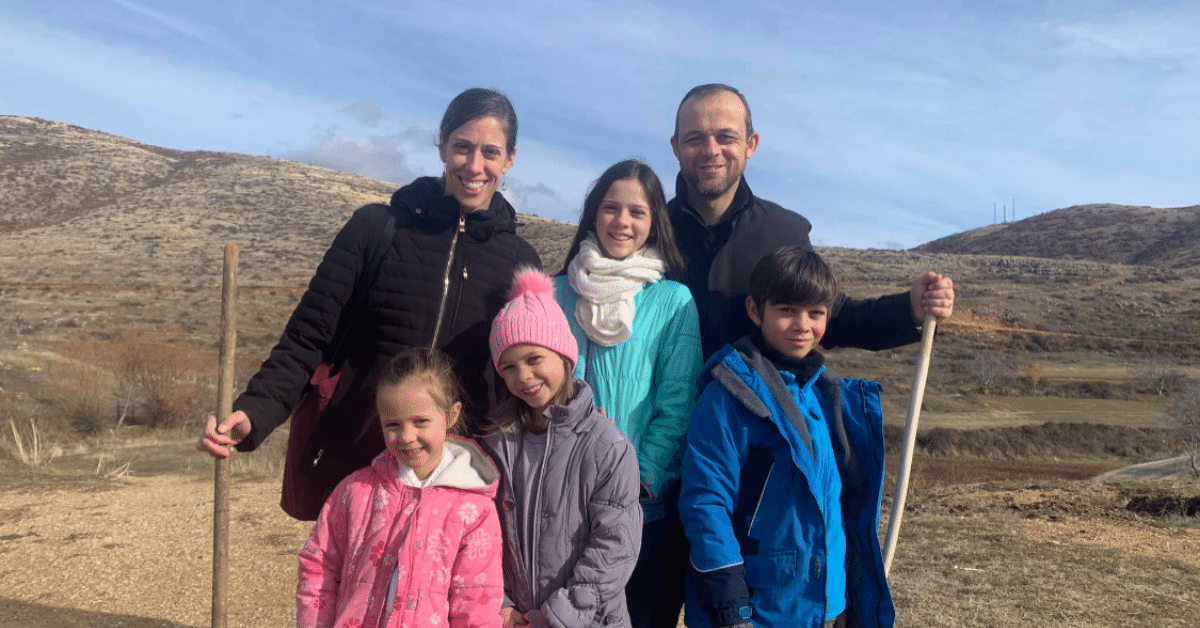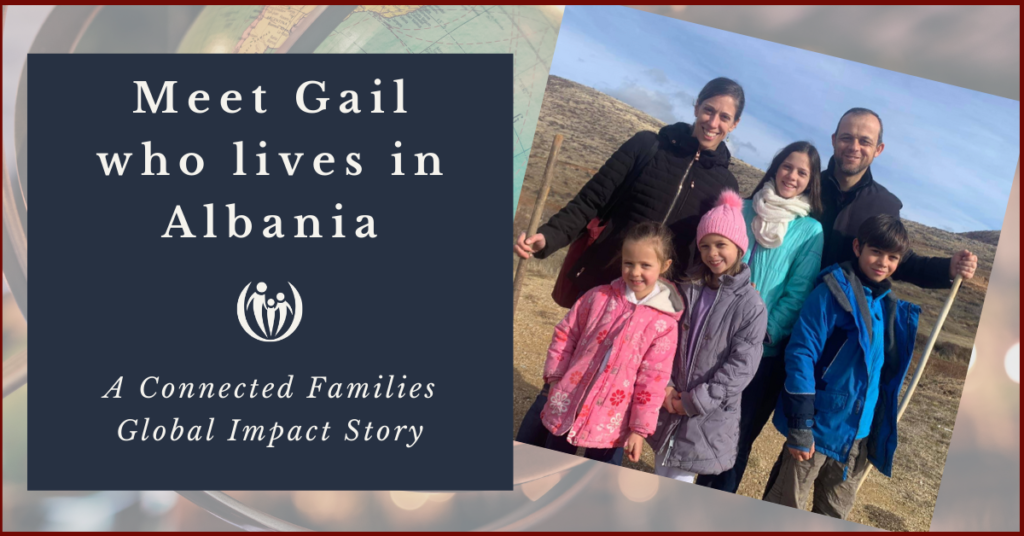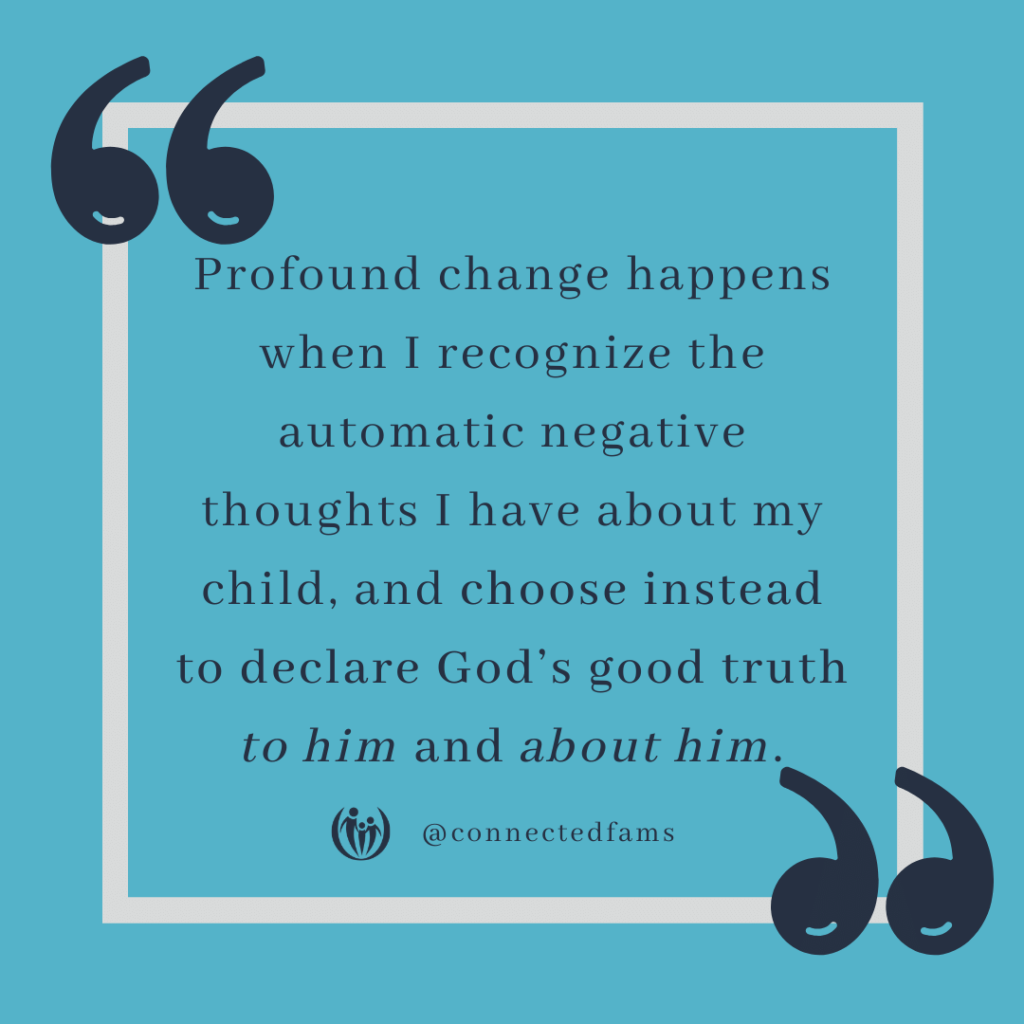
Meet Gail who Lives in Albania

For nearly twenty years, Connected Families has been equipping and empowering parents to lead their families with grace. As a tumultuous 2020 comes to an end we are excited to introduce you to families around the world who are embracing the Connected Families Framework in their home. Connected Families is transforming, equipping, and inspiring families all over the globe!
Today we are excited to bring you the story of Gail, who moved from the United States to Albania 16 years ago. Gail’s husband is an Albanian pastor of a local church, the only protestant church in a community of 11,000 in rural southeastern Albania. Together they serve with Alongside Ministries International to strengthen the church and advance the gospel in this area.
Personally, Gail focuses on family ministry, beginning in the practical work of lactation consulting and continuing into coordinating children’s discipleship and a mom’s group through the church. This mom’s group is highly evangelistic, inviting mothers from the local preschool and school to engage with felt-needs in child-raising. Let’s hear how Connected Families has made a global impact in Albania!
What has been the one major take-away you’ve learned and how have you applied that?
The biggest take-away I’ve received from Connected Families has been to identify and validate the “deep waters” in each of our hearts. I’m tuning into what is going on in myself and seeking to understand what is in each child’s heart during our more intense interactions. I sometimes lament that my kids are high-strung but then recognize that they have a high-strung mama!
Countless times I have hit pause with a soapy finger, listening to a Connected Families podcast while washing dishes, and turned to my prayer journal to capture and reflect on what I’m hearing. When I feel like I’m crazy or a fraud, Connected Families articles have such a grace-filled tone. They normalize my experience and give me courage to press into this important call of leading our kids to life in Jesus.
Do you have a story that exemplifies what you’ve learned?
My son, in particular, has struggled with extremely intense emotions. These emotions have at times hurled him into angry fits which scared me and left me trembling, desperate. But I have learned to seek his heart apart from his behavior. I have come to recognize my automatic negative thoughts about my son, and chosen to declare God’s good truth to him and about him.
I remember to breathe and relax my hands before I respond to him, to hold him accountable for his actions while validating his primary emotions. He is not as easily angered as he used to be, and I can see that now. He is able to articulate that he is feeling afraid of failure or rejection and can more quickly bring himself to a calmer place. My son knows he is loved and cherished, even when he endures consequences for unwise choices.

What is the primary culture in your family’s home life? And in your community?
Our home is a mixture of our American and Albanian culture, though at this time it expresses more American. Albanian worldview and values are inextricably woven into our life. Because of this, we seek to embody biblical culture rather than one or the other of our two “earthly” cultures.
Our community is entirely Albanian, influenced by western media and immigration. But it is also a post-communist, emerging generation with limited internal resources. Some Albanian family values like loyalty, hospitality, and hard work are to be well-esteemed.
However, other areas of family life like nurturing, healthy communication, self-awareness, confession and repentance, or attunement to their children’s hearts are immensely under-developed. Sadly, even the Christian parents (less than 0.05% of the population) carry heavy baggage which they bring into their parenting. It is hard to recognize you’re swimming in polluted waters when you’ve never been out of them.
How does the CF framework fit with your culture?
I do not see the Connected Family framework principles to be bound by culture. They are based in scripture and confirmed in relational neurobiology. Granted, they are not the typical way Albanian parents (Christian or non-Christian) would perceive their child-rearing priorities. But neither might they be for many American families who enter discipline situations focusing mainly on the children’s behavior.
In your experience, what has been the value of the framework from a cultural perspective?
The message of the Connected Families Framework is critical to the Albanian context in the 21st century. We are a first-generation church, thus first-generation Christian parents in an emerging Christian culture. Traumas and emotional unhealth are the norm both in parents’ pasts and current family dynamics.
Parents are largely unaware of their own emotional undercurrents. The culture is quick to praise, compare, shun, and remove love, based on performance. Children are either excused or ill-equipped to make good choices. And a lack of follow-through and accountability is a cultural sickness in this generation. Therefore, we have found the CF framework to be supremely valuable as an approach for equipping parents to lead their children to walk in a redeemed life.
Do you have any stories related to the framework and making it work in your culture?
I see the framework works in this culture because it is dealing with heart issues and biblical application. The stories among my family and moms in my life are plentiful, simultaneously profound and common!
Some recent examples of how we’ve seen the framework in action:
- Some moms and I enjoy standing around during coffee time, after evening Bible study. We like to brainstorm solutions for uncooperative tween and teen daughters. I offer the perspective that when we nag and remind, we are owning the problem more than our child; what would happen if we ask them thinking questions instead of telling them what to do?
- Another instance recently, some boys came to me red-cheeked and angry, tears near the surface after some felt offended by an unfair play in football [soccer] and others were crushed by the rude remarks that ensued. I am able to help the boys recount the event, by listening to each other’s needs and feelings. We play a quick re-enactment (do-over!) of the scene with different choices—and different outcomes.
- Finally, just last week a Sunday School teacher and I were discussing a behavior issue in class with a smart-mouthed (but loved) grade-schooler. I coached the teacher through calling him to respectfully account for his actions immediately. I encouraged the teacher to hold him accountable, setting boundaries for their relationship and their time together.
We are so grateful for the Connected Families framework and how it’s working in our home and culture!
Frustrated by constant discipline challenges? Take 15 minutes to read our free ebook 4 Messages All Children Long to Hear: A Discipline That Connects Overview.

